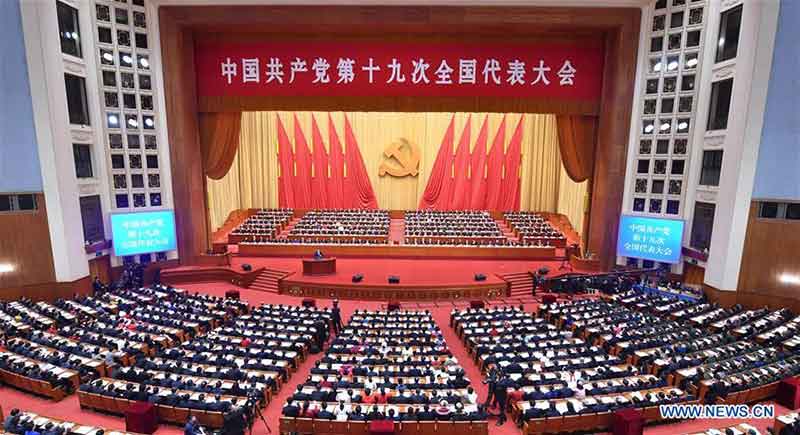

Xi Jinping delivers a report to the 19th National Congress of the Communist Party of China (CPC) on behalf of the 18th Central Committee of the CPC at the Great Hall of the People in Beijing, capital of China, Oct. 18, 2017. The CPC opened the 19th National Congress at the Great Hall of the People Wednesday morning. (Xinhua/Li Tao)
BEIJING, Oct. 20 (Xinhua) -- The Communist Party of China (CPC) is holding its most important meeting in five years to chart the future course of the country at a time when the world is beset with challenges and disorder.
Globalization has been facing hurdles while protectionism and populism are rising. Nearly a decade after the 2008 global financial crisis, the world economy is still grappling with uncertain long-term outlooks. Global confidence in a strong future growth has yet to find a solid foundation.
Against the backdrop of violence in Iraq and Syria, although Islamic State militants are losing, lone-wolf attacks have emerged as the new face of terrorism. The age of pervasive social media has made it unprecedentedly convenient for extremist groups to recruit, plot and strike.
These symptoms all point to a graver crisis -- the ever widening global deficit in peace, governance and development.
A CONTRASTING MAP
In contrast, China, under the leadership of the CPC, is trying to map out a road leading to a better world by promoting not only its own development but also that of other countries.
The commitment has been reiterated in the report Chinese President Xi Jinping delivered Wednesday at the opening of the 19th CPC National Congress in Beijing.
Over the past decade, China has been widely regarded as a leading economic locomotive that has, along with other economic powerhouses, pulled a lackluster global economy up a steep hill.
According to data released by China's National Bureau of Statistics, China's average contribution to global growth from 2013 to 2016 was about 30 percent, the largest among all countries.
For Xi, who was elected general secretary of the CPC Central Committee in 2012 and president in 2013, one of the top priorities is to ensure a robust growth of the Chinese economy, which matters to the rest of the world as well.
To restructure its economy for better quality growth, China has introduced a series of supply-side structural reform measures. They are reducing excess inventories, cutting overcapacity, deleveraging, lowering costs for businesses, and streamlining bureaucracy.
The past five years have also witnessed China's persistent drive to promote social justice and equality by reducing poverty. China has lifted an average of 13 million people out of poverty every year since 2012, according to official data. And over the past four decades, more than 700 million Chinese have been freed from poverty, accounting for 70 percent of the global efforts in the same period.
Overseas, China has reached out to the international community with a set of proposals on how to better maintain global security and peace and spur development.
COMMUNITY OF SHARED FUTURE
In such a highly interdependent world, where the fates of all nations, big or small, rich or poor, are tightly intertwined, Xi has proposed that all nations come together to build a community of shared future for mankind.
This vision led to the Belt and Road Initiative, which aims to better connect Asia with Africa and Europe, and to strengthen the industrial capacity of nations in these regions so that they have the fundamentals to grow their economies.
The initiative is also one of China's tools to help eradicate the root causes of terrorism and other extremist elements and build a safer world. As Xi has reiterated, "Development holds the master key to solving all problems."
In the past five years, China has also steadfastly promoted peaceful and diplomatic means to solve many of the global crises like the Korean Peninsula nuclear issue and global warming.
Improving the post-war global financial system is critical to promoting global justice and balanced development. In this regard, China has played a pioneering role, pushing for quota reforms in the International Monetary Fund and the World Bank.
Xi once said China's ongoing reforms have sailed into uncharted "deep waters" where what is left is mostly the hard nuts to crack. The situation is the same with the rest of the world, if not worse.
Yet that should not be an excuse to turn back or turn against each other. Rather, it should be the reason for all nations to join hands and eliminate the deficit in global governance.
As many foreign leaders and observers have pointed out, China has set an instructive example in this regard.